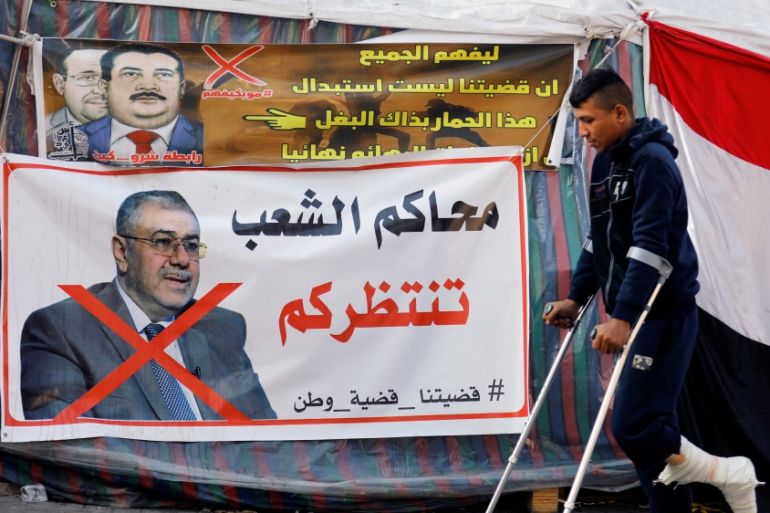Iraq anti-gov’t protests resume amid political deadlock
Protesters call for political overhaul and electoral reform as negotiations over new prime minister remain deadlocked.

Thousands of protesters blocked roads and bridges in southern Iraq on Monday, condemning Iranian influence and political leaders who have missed another deadline to agree on a new prime minister.
Anti-government demonstrators burned tyres in major cities across the south, forcing the closure of schools and government buildings, AFP correspondents reported as political paralysis deepened in Baghdad.
Keep reading
list of 3 itemsIraq protests: Increase in number of disappearances
Iraq must ‘take actions’ after attacks on US interests
Negotiations over a candidate to replace Adel Abdul Mahdi, who resigned in November in the face of protests against corruption and unemployment, remained at a stalemate as a midnight Sunday deadline expired.
Iraq’s constitution requires that the parliament’s largest bloc name a candidate for the premiership within 15 days of accepting the prime minister’s resignation. That deadline expired last Thursday but was extended until midnight on Sunday. No new deadline was set.
On the street, protesters are mobilising anew after weeks of relative calm in a movement that has seen hundreds killed in clashes with security forces.
Demonstrators announced civil disobedience campaigns in the southern cities of Diwaniyah, Nasiriyah, Hilla, Kut and Amara, where schools and public buildings were closed on Monday.
“We are upping our actions because we oppose any candidate from the political class that has been robbing us since 2003,” said Ali al-Diwani, a young protester in Diwaniyah.
For Iraqis protesting since October 1, the system installed by the United States after it led a coalition to overthrow Saddam Hussein in 2003 has become dominated by Iran and is beyond reform.
Political paralysis
While renewed protests risk a resumption of the violence that has already caused 460 deaths and 25,000 injuries since October, the government remains paralysed.
Officials say Iran favours the appointment of Qusay al-Suhail, who served as higher education minister in the government of Abdul Mahdi.
A former key member of Shia cleric Muqtada al-Sadr‘s movement, al-Suhail rejoined the State of Law Alliance of former Prime Minister Nouri al-Maliki, who is close to Iran and an enemy of al-Sadr.
Demonstrators categorically reject his candidacy and that of anyone from the wider political establishment.
“What we want is simple: a prime minister who is competent and independent, who has never been involved with the ruling parties since 2003,” said Mohammed Rahman, a protesting engineer in Diwaniyah.
Protesters say an overhaul of the political system must start with electoral reform.
Since 2003, elections have used a complicated mix of proportional representation and list voting that favours major parties and the heads of lists.
Protesters say they want a first-past-the-post system to “guarantee a new generation could enter politics to clean up everything the ruling parties have corrupted,” Rahman told AFP news agency.
Parliament has recently discussed electoral reform and was scheduled to resume talks on Monday afternoon.